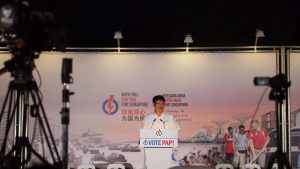(Not) Democratising Through Strength: Core Beliefs and the Institutions of Singapore’s People’s Action Party
November 21, 2022

The People’s Action Party (PAP) was formed on 21 November 1954 and has governed Singapore uninterrupted for more than six decades. This enduring political stability is the product of a highly cohesive, effective, and extractive state and party apparatus.
In ‘(Not) democratising through strength: core beliefs and the institutions of Singapore’s People’s Action Party’ (Contemporary Politics, 2022), Associate Professor Terence Lee (NUS Political Science) and Assistant Professor Walid Jumblatt Abdullah (NTU Public Policy and Global Affairs) explain why autocratic parties resist democratisation. Using the case of the People’s Action Party (PAP), A/P Lee and Asst Prof Walid explain how the normative foundations of authoritarianism and its subsequent institutionalism impede political change.
The PAP is in the midst of going through a leadership transition, and there have been public doubts raised about the ability of the succeeding generation to emulate their predecessors’ success. The party has also been subjected to more criticism with the proliferation of social media sites. COVID-19 has thrown an enormous challenge to Singapore’s government, and there have been increasing contestations to its core beliefs, especially meritocracy and multiracialism.
There are also signs the PAP’s political domination is eroding while electoral support for opposition political parties is steadily increasing. The Workers’ Party (WP) made impressive political gains, winning its first-ever Group Representative Constituency (GRC) during the 2011 elections, in which the PAP also experienced its worst-ever vote returns. In 2020, the PAP lost another GRC to the WP. The WP also secured more votes than the PAP in the six constituencies it contested.
Despite growing ‘ominous signals’ of its decline, the PAP instead became more repressive. Since 2015, the ruling party strengthened its repressive legal apparatus and took punitive actions against prominent academics, activists, and members of the opposition. Political competition and challenges to the ruling party’s pre-eminence mean less efficiency and therefore a bleaker future for Singapore. As such, the government maintains an electoral system gerrymandered toward the PAP, ensuring the opposition does not operate on a level playing field.
Institutional change occurs only when a ‘crisis’ is sufficiently galvanising or consequential. Although the PAP suffered some electoral setbacks through the years, it views its parliamentary losses and declining vote shares as Singaporeans expressing dissatisfaction with policies rather than the ruling party’s norms. Specifically, voter dissatisfaction relates to the lack of material welfare or deficiencies in the social compact, but not the core beliefs of the PAP. A sufficiently ‘galvanising’ crisis for the PAP would entail the loss of its two-thirds majority or a close enough result. This would be significant as it would inhibit the government’s ability to steam-roll through constitutional amendments such as the reserved presidential elections or legislation like the Protection from Online Falsehoods and Manipulation Act (POFMA). Furthermore, the absence of a leader taking the initiative to enact change makes it difficult for any institutional change to be implemented.
While the PAP has made policy adjustments after each election, these should not be considered evidence of democratisation, since the normative foundations underpinning the formal institutions in Singapore remain intact.
Read the article here.
